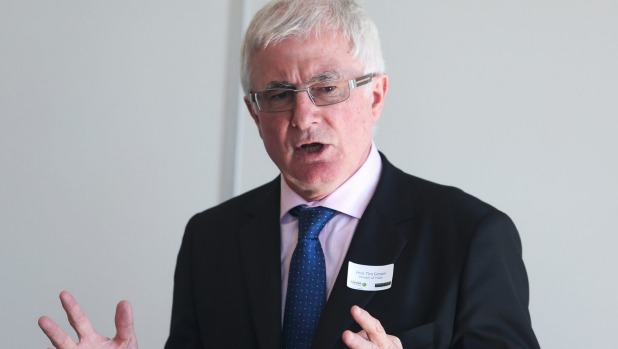 |
| Reviews and Templates for Expression We |
Tim Groser commits New Zealand to 11pc cut in greenhouse gases
 ROBYN EDIE
ROBYN EDIE
Climate Change Issues Minister Tim Groser said he balanced public calls to slash the country's emissions with a desire not to put "unfair costs" on particular sectors.
The Government has set a target of an 11 per cent reduction in greenhouse gas emissions on 1990 levels.
But critics say the New Zealand public has been completely ignored, with 99 per cent of submissions to the Ministry for the Environment calling for a target of 40 per cent or more.
New Zealand is required to announce a target for the years 2020 to 2030, which may be provisional, ahead of a key climate change summit in Paris in December. The meeting aims to keep global warming to a maximum of 2 degrees Celsius, to avoid long-term droughts, acidifying oceans and mass extinctions.
Climate Change Issues Minister Tim Groser described the goal as "fair and ambitious". He said New Zealand's high renewable electricity generation and agricultural emissions meant there were fewer opportunities to reduce its greenhouse gas outputs, which were the fifth-highest per capita in the world.
"[It] is a significant increase on our current target of 5 per cent below 1990 emission levels by 2020."
But Paul Young, of climate change group Generation Zero, said the views of the 16,000 public submissions went completely ignored. Just 53 people or groups were happy with a target of between 0 and 20 per cent.
A market research poll last year, funded by the Sustainable Business Council, of 2000 New Zealanders found almost 90 per cent were at least somewhat concerned about global warming.
"The target is pretty pitiful compared to what the science says is needed, and compared to other countries that have already made commitments," Young said.
There was plenty the Government could do now, such as investing in public transport and further renewable electricity generation or putting fuel efficiency standards on cars, he said.
Groser said while 16,000 submissions were received, the vast majority came from people who used the template of an environmental group. "Just because environmental groups put in thousands of identical submissions does not mean they are representative of New Zealanders' views."
Groser said he needed to ensure the target was achievable, and to avoid imposing unfair costs on any particular sector or group of people.
"Our investment in agricultural research is beginning to bear fruit, and the cost of electric and plug-in hybrid vehicles continues to fall. I think in five to 10 years we'll be in a good position to reduce our emissions in both agriculture and transport."
BusinessNZ described the target as "challenging but achievable with collective effort".
But Green Party climate change spokesman Kennedy Graham said the costs of reducing emissions now would be far cheaper than dealing with the fallout catastrophic climate change would have on GDP, farms and families.
"By committing to such a small reduction in greenhouse gas emissions, it means other countries will have to pick up our slack."
He also criticised the Government's choice to frame the target as a 30 per cent reduction on 2005 levels, instead of using the traditional 1990 standard. "Using 2005 as a benchmark is pure spin."
Labour environment spokeswoman Megan Woods said the Government appeared to have given up on the goal it set for itself four years ago, of halving emissions by 2050.
However, more important than setting targets was actually following through and meeting them – something New Zealand had so far been unable to do. "That's not surprising, because the Government has no plan on how we are going to reach them."
Ministry of Environment figures show that, in 1990, New Zealand's total greenhouse gas emissions were 60,641.4 tonnes. In 2012, total greenhouse gas emissions had increased by 15,406.5 tonnes, or 25 per cent, to 76,048.0 tonnes.
Adrian Macey, of Victoria University, said a great deal of work was needed on global warming policies, including the Emissions Trading Scheme.
"I would describe this as the minimum credible target ... New Zealand, along with other countries, will face pressure to increase the ambition of its target at and after this year's Paris climate change conference."
|
|
|
|
Copyright 2011 Energy and Technical Services Ltd. All Rights Reserved. Energyts.com |